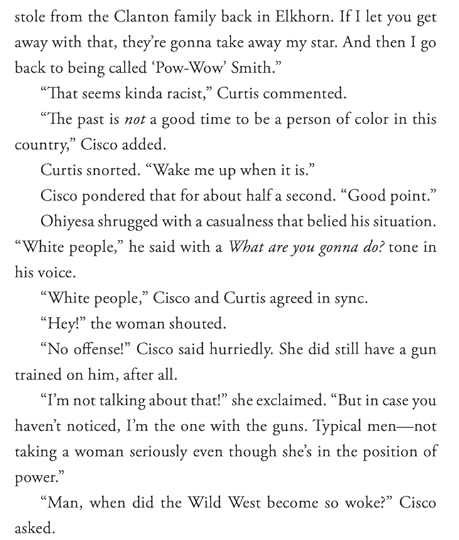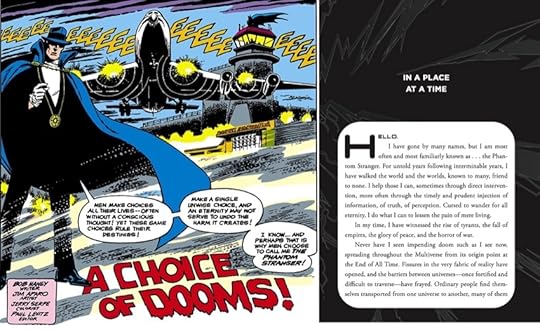Barry Lyga's Blog: The BLog, page 11
March 24, 2022
Stories I Never Told: Crisis on Captive Earths — Chapter 2
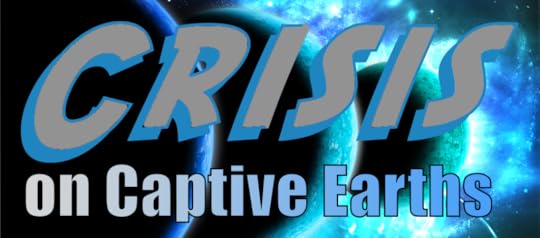
This issue’s notes are the thinnest, mostly composed of blocks of dialogue. The upshot is that Brainiac 5 reveals that the Time Trapper is preparing to exploit the chaos in the timestream and across dimensions wrought by the Crisis on Infinite Earths to extend his domain from the End of Time and finally rule all of time.
And of course it’s the Time Trapper. Of course I would use a Legion villain. It’s funny, too, because I can see some elements of this story ending up in my Flash series, decades later. Which means nothing to you, Gentle Reader, but tickles my funny bone something fierce. It’s like a gift from Teen Barry to Old Man Barry, handed across the gulf of years.
Anyway, Brainy reveals that the Time Trapper is behind all of the weird time shenanigans of late. The twentieth century is the focal point, so this has to be the staging area.2 He has a plan to defeat the Trapper, but he won’t say what it is because the Trapper could be eavesdropping.
Superman, of course, trusts Brainy implicitly and helps him settle into the twentieth century so that they can plan their attack on the Time Trapper. Brainy — good friend that he is — sees that Superman is more discomposed by Lex than usual and tries to help Superman understand the true depths of Luthor’s hatred for him.
BRAINIAC 5: Even when he was happy on Lexor, some part of him could not rest, knowing that you existed. He will never rest until you are dead, Kal-El. Nothing will stop him. Not until you’re wiped from the universe.3
Brainy begins to get really frustrated by the primitive technology and relatively weak heroes of the twentieth century.4
BRAINIAC 5: This Black Lightning person: Can he generate electricity in the terawatt range? Can he manipulate electromagnetic pulses?
SUPERMAN: Jeff? No, I don’t— I don’t think so.
BRAINIAC 5: This is not going well. If I had a good telepath, a transmuter… I’m tempted to try to re-create Omega or Computo—
SUPERMAN: Oh, Rao, no. Please, Brainy, promise me you won’t. I can get you a transmuter. Firestorm’s a good man.
BRAINIAC 5: I’m worried about his inexperience.
SUPERMAN: He’s older than Jan was when we let him into the Legion.
BRAINIAC 5: True.
Brainy considers using Daxam, but there’s no time to mass-produce the anti-lead serum, and he doesn’t have time to train “a billion amateurs” in the use of their super-powers, or to hand-pick Daxamites who could be useful. Superman asks about using the Rokynians: “I trained a group of them myself.” Brainy points out that Rokyn’s out of phase with this dimension right now.5
BRAINIAC 5 (frustrated): I could do a better job with Tyroc, Color Kid, and Porcupine Pete than with most of the heroes of this era.6
Truly desperate, Brainy tracks down the Brainiac of the twentieth century.
BRAINIAC 5: Hmm. You’re in the cybernetic form that you later abandoned.7 I have to confess, this is very interesting, but I can’t stay to examine it.
Turns out Brainy has an override code for the original Brainiac! He just shuts down his “ancestor” and then cannibalizes him for the parts he needs.
So now Brainy asks Superman to gather his forces at the Fortress of Solitude, which means — I assume — we’d see a big two-page spread a la George Perez in Crisis of all the heroes. There’s a little character bit that I have to admit cracks me up, thirty years later:
ROBIN: Hey, remember the last time we were here and I saved Superman and Wonder Woman from that Mongul guy?
BATMAN: Yes. We were all terribly impressed.
Anyway, moving on… Brainy isn’t ready to reveal his entire plan yet (of course not — he’s Brainy), but he does say that it’s time to test it. He’s going to use the Monitor’s tuning forks (left over from the original Crisis and still on the surviving Earths) to separate the Earths from each other…and seal one of them off in its own universe forever!
Dun-dun-DUN!!!!
End Chapter 2
More soon!
(The only glory I will ever get for this thing that I’ve carried in my brain since childhood is people looking at it. So if you have friends you think might get a kick out of it, please point them in this direction! Teen Barry thanks you, and so do I.)
March 23, 2022
Stories I Never Told: Crisis on Captive Earths — Chapter 1
If you don’t want to be completely lost, start with the Prologue, please…

The year is 1986.
The super-heroes of five Earths have defeated the Anti-Monitor in the Crisis on Infinite Earths, the greatest battle ever to befall them. Five remaining parallel universes are now interlinked, overlapping at certain points on Earth called “warp zones,” where travel between dimensions is as easy as crossing the street. Through joint agreements with the United Nations of each Earth, the warp zones are strictly guarded and quarantined.
Earth-4, though, is problematic. It is less experienced with super-heroes and especially with cosmic-level events such as the Crisis. The super-heroes of that Earth are trying to quell ongoing panics on Earth-4, but its continued connection to the other Earths is a major concern.1
Bad things are happening on all of the Earths — time goofs, random attacks from new villains and species. It’s [REDACTED] though no one knows it.2
Even Lex Luthor doesn’t understand what’s going on…which he admits only to his Lexorian power armor, which he has programmed with a sort of therapist AI.3
Superman reveals his identity to Lana. “No more secrets,” he tells her. Later, Lois realizes something is up.4
LOIS: He told you, didn’t he?5
LANA: I don’t know what you’re talking about.
LOIS: That’s OK. You can pretend. It doesn’t bother me. I’m glad he told you. You two…you’re good for each other. Sometimes first loves are best loves.
LANA: Lois…
LOIS: No, no, it’s OK. Really. I wish he had told me. I wish he had trusted me or loved me enough.
LANA: But you know.
LOIS: What am I, stupid?6 It’s a great disguise, I’ll admit. So much more than just a pair of glasses, really. You know, eventually I realized something. I realized that it must mean something to him, having people not know. It must be important to him. So I backed off. I stopped snooping, stopped trying to prove it. I knew the truth, and that was all that mattered. I just wish he’d told me. But I’m happy for you, Lana. I really am.7
I have a note in here that reads simply “Lots of conversations between Kal-L and Kal-El, including (this is so cool!) the events of Action Comics #1, told from Kal-L’s POV!” Yes, the parenthetical is right there in black and white. I…guess…it would be cool? I’m not sure what I was going for. And Kal-L is never mentioned again, so… 🤷♂️.
There is another note that “Green Lantern and the Corps are in the anti-matter universe, trying to rebuild.” I’m not sure if that means they’re trying to rebuild the anti-matter universe after the Crisis (why would they???) or if they’re trying to rebuild the Corps after its losses during same. In any event, I suspect my younger self was trying to remove a very, very powerful set of pieces from the board so that readers wouldn’t wonder why the GLC didn’t swoop in to save the day. YMMV.
Meanwhile, Lex decides to kill everyone Superman loves since he can’t kill Superman himself.8 He starts by kidnapping Lana. He threatens to kill her right in front of Superman when suddenly Brainiac 5 appears from the future.
BRAINIAC 5: We need to speak, Kal-El.
SUPERMAN: I’m busy right now, Brainy. Lana is—9
BRAINIAC 5: —a Legionnaire. She can take care of herself.10
LUTHOR: Brainiac? Since when did you—
BRAINIAC 5: Lex. I didn’t realize that you were still using the Lexorian battle armor at this point in history.
LUTHOR: Wait. I recognize you. You’re not the real Brainiac. You’re one of those brats from the future. You’re the one who’s almost intelligent.
BRAINIAC 5: Truly, Superman, we need to speak.
SUPERMAN (exasperated): Brainy!
So, Superman and Brainy rescue Lana and lock up Lex again. Then Brainy reveals that he’s come to the past because there is a new, growing threat. Something is taking advantage of the instability and chaos in the wake of the Crisis, and the front in the war is, as ever, Earth in the twentieth century.
Superman doesn’t want to hear it. He’s tired, man! Everyone is!
SUPERMAN: Brainy, we just saved the universe. Several of them, in fact.
BRAINIAC 5: And didn’t save billions of them.
SUPERMAN: That’s unfair.
BRAINIAC 5: Regardless, it’s true.
Superman says that the time weirdness and everything is under control. The Earths are still connected, but they can deal with that. And in the meantime, he has a slew of villains on the loose to deal with, and Lex will probably break out again any day now — he really needs to find a way to deal with Lex once and for all.
Brainy reveals that Superman’s diary11survived to the thirtieth century. Most of it is unreadable, but one entry is in English and reads, ominously: “Lex is no longer an issue.”
End Chapter 1
And that, weirdly enough, is the end of the notes for Chapter 1. It seems like a strange place to end, but this isn’t an actual script — just notes.
More soon!
(The only reward I will ever get for this thing that I’ve carried in my brain since childhood is people looking at it. So if you have friends you think might get a kick out of it, please point them in this direction! Teen Barry thanks you, and so do I.)
Stories I Never Told: Crisis on Captive Earths — Prologue
Bear with me: There’s a story before the story to this one.
1985: DC Comics publishes Crisis on Infinite Earths. Before the series is even over, DC announces a follow-up: Crisis on Captive Earth (note the singular). CCE is slated to be drawn by Jerry Ordway and written by my favorite comic book writer, Paul Levitz. Needless to say, I’m psyched!
1986: Crisis on Captive Earth never happens. Instead, DC publishes Legends, written by Len Wein and John Ostrander, with art by new Marvel expat John Byrne. What happened to CCE? Who knows?1
Now, look — if you don’t know anything about the original Crisis series, it’s beyond the purview of this humble BLog to educate you. Hie thee to Wikipedia, if you must. Suffice it to say, while I loved the series itself, I was less sanguine about the repercussions, which winnowed down the incredible DC multiverse to a single universe and timeline. This, I did not like.
Thus, in 1986, at the tender age of 15 and disappointed both in the ending of the original Crisis and the lack of a Levitz follow-up, I conjured…Crisis on Captive Earths (note, this time, the plural).
And now, decades later, I’ve found my notes for it.
It appears that I kept adding to the notes, probably through college, when I got my first Mac and committed it all to disk.
I’ve cleaned up what follows because in many cases the notes were scattered throughout the document and while I could follow the story that way because I know how my brain works (sort of), I figured a more linear presentation would be best for public consumption. I tried to present an honest version of what I wrote back then, but inevitably, some of present-day me will creep in.
I will also occasionally drop in via footnote to give context if I think it’s interesting, needed, or just amusing. There are bits of dialogue I wrote (forgive me) and I will reproduce them as-is (again, forgive me).
There are seven issues in total (and, thus, there will be seven posts): a prologue and epilogue, with five issues in between.
On Twitter, I referred to this story as a sequel to the original Crisis, but it’s more accurately something like half a reboot.
Let me explain.
In Crisis, the infinite earths are whittled down to five, and then those five are merged into one.
In my Captive Earths, I imagine instead that the five earths remained extant. That in the battle at the Dawn of Time seen in Crisis on Infinite Earths #10, the Spectre is able to defeat the Anti-Monitor decisively and protect the remaining earths, though at the expense of his very existence. Thus, the status quo when my series opens: Five parallel worlds, wracked by the horrors of the Crisis, trying to recover from a universes-shattering event, still partly connected and suffering from the overlap.
Here you go, from my fevered teen brain to you; I present…

The thirtieth century2 is devastated from the events of the Crisis on Infinite Earths, including the critical moments at the Dawn of Time when the Spectre wrestled with the Anti-Monitor for the fate of the multiverse. In the aftermath of that battle, the Anti-Monitor was defeated, though at the expense of the Spectre’s existence. The heroes present at the Dawn of Time — including the members of the Legion of Super-Heroes — have found themselves flung back to their home eras and dimensions.
At the thirtieth century’s Time Institute, Rond Vidar attempts to catalog and quantify the massive changes to the time/space continuum created by the Crisis and its multi-pronged temporal attack. Vidar was not present at the Dawn of Time, but his research and discussion with the Legionnaires has filled in many of the details. He has learned that the remaining parallel worlds — Earths 1, 2, S, X, and 4 — are still interlocked, though their merging has halted and the time glitches that plagued them seem to have stopped.
For now.
While the devastation to the thirtieth century has been horrific, it pales in comparison to the rest of the timestream, thanks mainly to the existence of the Time Beacon and the Infinite Man (as chronicled in Legion of Super-Heroes Volume III, #173). Rond’s efforts to piece together a chronology of the Crisis are hampered by the havoc along the timestream and also by the absence of Brainiac 5, who is in mourning for the death of Supergirl.
Hoping to comfort his friend and also to get Brainy back to work on the problem of quantifying the changes to the timestream and their implications for Rond’s ongoing time travel research, Rond goes to Legion headquarters, where he and Mon-El discuss the Crisis and potential ways to get Brainiac 5 “back on board.” Rond enlists Mon-El in his efforts, since Mon is a veritable treasure-trove of first-hand historical experience, having personally witnessed an entire millennium.4
It’s also, Rond figures, a good way to keep Mon-El’s mind off of the death of Supergirl, which is bothering all Legionnaires, but hitting Mon-El particularly hard.
As the two begin their research (commandeering Brainy’s lab), they begin to find strange temporal glitches. Are these “bleed-throughs” from the other alternate earths, or the result of permanent damage to the timestream? One such glitch is in the form of an image preserved from the late twentieth century, purporting to show a gathering of super-heroes, including members of the Justice League…and an old Coluan.
Rond and Mon-El figure that the mysterious Coluan is the perfect way to get Brainiac 5 interested again. There are no previous records of Coluan contact with Earth so early in history (save for the original Brainiac robot), and this is just the sort of thing that should jump-start Brainiac 5’s curiosity.
To their chagrin, Brainy seems completely uninterested in the old image, dismissing it and them.
Later, Rond returns to the Time Institute…only to discover that his work has been destroyed, his records ransacked. Even his Time Cube — outdated and obsolete, kept around purely for nostalgia — has been destroyed.
At the same time, Mon-El comes upon Brainiac 5 in the Legion lab, where he is packing equipment into one of the time bubbles. Mon-El asks what Brainy is up to.
BRAINIAC 5: Mon-El, you’re aware of the serum I created that keeps you alive.
MON-EL: That’s a stupid— Of course I am…
BRAINIAC 5 (tapping buttons on his belt): I built in a deactivation mechanism, just in case.
MON-EL: I don’t—
BRAINIAC 5: And I just activated it.5
Mon-El collapses in agony. Just before he falls into a coma from massive lead poisoning, he sees Brainy hop into one of the time bubbles. Then, as the bubble fades into the timestream, the other time bubbles all explode, along with the rest of the lab, leaving Mon-El dying amid the wreckage.
End Prologue
More soon!
(BTW: Look, the only reward I will ever get for this thing that I’ve carried in my brain since childhood is people looking at it. So if you have friends you think might get a kick out of it, please point them in this direction! Teen Barry thanks you, and so do I.)
February 2, 2022
Stories I Never Told: The Fury of Firestorm
For every story of mine you see, there are many that never managed to make the leap from my brain to your eyeballs. Stories I Never Told is where I rectify that.
Listening to this wonderful interview with comic book legend Gerry Conway reminded me that a few years back — at the beginning of the Trump Years, as you will see — I pitched a Firestorm graphic novel to DC Comics for their then-new young adult imprint. It was rejected, for reasons I’m still not entirely clear on.
Anyway, I’m sort of glad it was rejected. Since then, I’ve come to feel that if the creator of a character is still alive and interested, then only that person should be writing the character in question. If the creator is not interested, then he or she is free to “bless” another writer. But really, unless Gerry Conway says it’s OK, no one else should be writing Firestorm.1
But hey — I’m still happy to share the pitch with y’all. Check it out…
The Fury of
FIRESTORMby Barry Lyga
Sometimes you can only rely on yourself…
…and maybe the voice in your head.
We don’t have to write stories about kids learning that they can change the world. Check out Parkland. They already know.
But there’s still a place for stories about what to do with that power.
All things being equal, you probably think you’d like to be Ronnie Raymond. Handsome, well-liked, high school football star-in-the-making… Surrounded by friends, dating Doreen Day, who’s one of the smartest kids in school…
And oh yeah — a little while back, he happened to be present when a nuclear facility went ker-blooey, and as a result he was gifted with an array of super-powers, including the sexy-sounding “atomic restructuring.” Which basically means he can convert any inorganic matter into any other form of inorganic matter. Need a gold bar conjured from thin air? Need your backpack turned into a diorama of the surrender at Appomattox in time for third period History class? Firestorm’s your man.
Not bad.
But every silver lining has its cloud.
Ronnie can only become Firestorm by merging with Professor Martin Stein, who was with Ronnie when the nuke plant went sky-high. They form a whole new body, with Ronnie in control, but with Stein as a nagging, too-smart, old man voice in his head. Sometimes the guy gives good advice, but most of the time, honestly, it’s like a 24/7 livestream of your parents bitching at you.
Then there’s this: even though Firestorm mitigated almost all of the damage from the explosion, everyone assumed he made it happen in the first place since he was a super-powered guy on the scene. So the cops, the FBI, the NRC, the CIA, the NSA, the DEO, and pretty much every other TLA out there wants Firestorm in their greedy little clutches.
It’s tough to be a super-hero when you’re also a wanted man. Fortunately, Ronnie and Stein can split and no one’s ever the wiser.
Still…
He’d like to do something. He has all this power, and yet it feels like he’s wearing chains. Every time he tries to do something, he just gets chased down by the cops and pilloried by the media. What’s the point of having that power?
His “civilian” life isn’t much better. Yeah, he’s a football hero, but he’s losing his love of the game. One more year to graduation, and Ronnie’s only hope for college (and sticking with Doreen, whom he adores) is a football scholarship. After all, his grades don’t exactly set the world on fire, and his dad is an investigative reporter for a dying print publication. Which isn’t really a high-paying gig. Dad gets offers all the time from tony internet sites to work for them, but refuses to compromise his principles, no matter how much Ronnie begs him to “get a real job.”
Oh, and also: He’s dating the principal of Ronnie’s school. Come on!
Ronnie Raymond has all the power of a god, but he still can’t get his GPA above 2.9 and he still can’t figure out how to fix his mess of a life and he can’t even summon up the enthusiasm to join in the campus protests against the border wall that’s almost finished construction. Everyone else is engaged; why not him?
His football has become sloppy as he struggles with all of this, and during a critical game, he freezes up at one point, almost costing the team a win.
Dad gives him hell for it. “You just stood there! Like a deer in the headlights!”
“Really original, Dad.”
“I get paid for original, Ronnie. I don’t need my thesaurus to tell my kid to get his head out of the clouds and into the game.”
“But there was no good move! I had blockers on one side and a tight end on the other, and—“
“And when you have no good choices, you choose the least bad one. You do something.”
Fed up with his dad, losing his sense of self, Ronnie decides that he has to confide in someone about his double life. He can’t tell Doreen — she’d freak out, and he can’t live in a world where she doesn’t want to be with him. So instead he tells his best friend since grade school, Johnny St. James. They’ve shared everything, and on the football field, they’re pure magic together.
Johnny takes the reveal pretty well, actually. And then he tells Ronnie that since they’re sharing big secrets…
“I’m an alien.”
Ronnie goggles. “You mean…like Superman?”
Johnny laughs. “No, dude. More like Undocumented Man.”
Johnny’s birth name was Juan Santiago. His parents brought him across the border when he was two and a half, and they’ve lived here ever since. Johnny’s never told anyone, and it’s a huge burden lifted to finally speak it out loud.
Unfortunately, overhearing is Cliff Carmichael, the “brain-jock” of East Park High School. Cliff’s the kid who sold his first app to a start-up at the age of 12. He’s always been top dog, and he knows it. The only thing that bothers him more than bugs in his code is the idea that his peers are still stupid enough to worship the Neanderthals who play sports.
So of course he drops a dime on Johnny in order to gut the football team. And the next thing you know, the whole family’s been snatched up by ICE for deportation.
Ronnie’s dad, the big, bad investigative reporter, is no help. “Sometimes, son, all you can do is shout to the world Here’s a problem! And that’s more than you think. Awareness matters.”
Awareness matters??? Ronnie’s plenty aware, thanks. He needs to take action.
He’s never actually met Professor Stein before. They’ve shared a body, but never interacted when not Firestorm. Ronnie goes to him, thinking a guy that smart has to have some ideas.
And he learns a horrible secret: When he’s not Firestorm, Stein is a barely-functioning alcoholic. The transformation process clears his mind for their super-hero stints, but when he’s a civilian, he’s…
…just as useless as Ronnie’s dad.
And the teachers who watched ICE agents snatch Johnny out of Chem class.
And the politicians who can’t be bothered to figure any of it out.
Ronnie…
…loses it. And when he decides to go nuclear, well…take it literally.
He’s all-too-aware of his limitations. The ability to restructure matter doesn’t let him change the law. Or people’s minds. The only thing he can do is track down the Santiagos, who have been stashed away in a terrifying, extra-legal ICE facility.
Firestorm turns the place into steam, releasing everyone.
It feels good, even though ICE is now another one of those TLAs that would like to…talk to Firestorm. The good feeling doesn’t last, though. For one thing, it turns out his dad had been investigating the facility for a year and was working on a book that would have changed his life. Now, thanks to “that goddamn superhero!” it’s all moot.
And most of the detainees are quickly recaptured, though at least now they’re in actual law enforcement custody, where they can try to avail themselves of the courts. Better than ICE’s black sites.
But not good enough.
When you have no good choices, you choose the least bad one. You do something.
With ultimate power at his fingertips, Ronnie realizes that it’s incumbent on him to take a stand, force people to think, change the status quo. He has precisely zero good options, but he can’t let that stop him.
He flies south, to where the border wall is being constructed. It would be easy to vaporize the wall, but that would just leave nothing there. Nothing for people to contemplate.
Ronald, Professor Stein says, what on earth are you going to do?
Something.
So, instead of taking the wall down, he blasts massive holes in it. Now there’s a monument to failure on the southern border, a KEEP OUT sign that’s been shotgun-blasted. That “big, beautiful wall” is now a pointless eyesore.
Let people see that; let them see the futility of a wall.
Ronald, says the Professor with an almost parental sigh, they’ll just repair it.
“Let ‘em,” Firestorm says, flying away. “I’ll come back and do it again.”
And again.
And again.
As many times as it takes.
January 19, 2022
Generation Wonder: The New Age of Heroes is Coming!
Been sitting on this one for a long time, and I am so happy to announce it!
A high-flying YA anthology featuring 13 short stories that turn superhero tropes on their head and offer fresh perspectives on modern myths
Triumph. Tragedy. The empyreal. The infernal. Even the mundane, filtered through the fantastical. Superheroes are, appropriately enough, a sort of super-genre, encompassing all other story types.
This YA anthology features 13 short stories that creatively turn superhero tropes on their head, while still paying homage to the genre that has found fans for more than eight decades. And there will be no mistake—superheroes don’t have to just be generic handsome white dudes. Everyone in the world, no matter their race, sexual preference, pronouns, or level of ability, has dreamed of flying.
Contributors include six New York Times bestselling authors, seven multiple award winners, a founder of We Need Diverse Books, and at least one author with millions of books in print in the U.S. alone. The collection is edited by New York Times bestselling author Barry Lyga, and it also features illustrations from Colleen Doran—New York Times bestselling cartoonist, and artist of the legendary Stan Lee’s memoir. The full list of contributors includes: Barry Lyga, Paul Levitz, Sarah MacLean, Lamar Giles, Elizabeth Eulberg, Danielle Paige, Varian Johnson, Joseph Bruchac, Morgan Baden, Matthew Phillion, Anna-Marie McLemore, Sterling Gates, and Axie Oh.
If you know anything at all about me, it’s that I love super-heroes. And I’ve always wanted to assemble my own Legion of Super-Authors to give the world a slew of new ones. Now it’s happened. Generation Wonder will thrill you, tickle your funny bone, make you cry, and surprise the hell out of you. It’s an assemblage of people known for doing super-heroes…and known for not doing super-heroes. Of YA authors and non-YA authors and even a couple of folks who’ve never written prose before.
I can’t wait for you to see it, along with Colleen’s gorgeous illustrations!
You can preorder the book here. And then put June 14 on your calendar and get ready to fly.
December 17, 2021
Stories I Never Told: Superman Confidential
It’s been a while since I’ve done one of these. Recently, I was plumbing the darkest depths of my hard drive and came upon a story pitch I wrote at DC’s invitation a million years ago.1
I can’t remember exactly how I ended up talking to DC (I think Brad Meltzer told them about me…?), but they asked me to come up with single-issue pitches for a couple different titles. At the time, there was a series called Superman Confidential. Well, you say Man of Steel and I say, “Sign me up!”
The assignment was to develop a single-issue story that could drop in at any point. So, no earth-shaking changes to continuity or anything like that. My pitch made it through the assistant editor, then the editor, then died on Dan DiDio’s desk because, in Dan’s words, “This isn’t a Superman story.”
Well… You decide:
Superman Confidential:
“For the Man Who Has Nothing”
The Man of Steel can’t defeat death…but can he defeat hopelessness?
We open on a splash: It’s Saturday night and Brian is at a party, surrounded by his family and friends. He’s the happiest man in the world. In this moment, Brian has everything.
And then we flash back: On Monday, Superman stops a bridge from collapsing in downtown Metropolis. And there’s Brian, one of the city’s homeless, watching the whole thing. Superman takes Brian to a shelter…and puts the incident out of his mind.
On Tuesday, Superman fights the Parasite at Centennial Park. And yes, Brian’s there, trying to sleep on one of the benches, wrapped in newspapers. Superman tries to talk to him, but Brian’s delusional. Worried about his mental state, Superman dutifully drops him off at a clinic before leaving on another mercy mission.
But on Wednesday… There’s Brian again. In the way again. Not in a hospital room somewhere. Not in a shelter.
Now Superman’s got an interest in this guy.
Intercut with this ongoing story, we revisit Brian in his paradise, with his friends and family. He has everything.
Visiting the shelter and the clinic and talking to Brian (who fades in and out of lucidity), Superman learns something horrible from the clinic doctor: “He has end-stage brain cancer, Superman.”
“Yes,” Superman says. “I see it now.”
Brian will die within the week.
“I wish there was something someone could do for the poor guy,” says the doctor.
“Guess what?” Superman replies.
He takes Brian to the Fortress of Solitude, where we witness a big splash of two incongruous worlds in collision: Brian sits there, a disheveled, dying homeless man surrounded by alien architecture and technology beyond human understanding… And he asks for a cookie.
Superman tries to ease Brian’s pain and descent into delusion with the many amazing and wondrous distractions the Fortress has to offer. But in the end, he realizes that all he can do is make Brian comfortable. And maybe, just maybe, ease his pain.
And so, he offers Brian the Black Mercy, the semi-sentient plant/fungus that bonds with its host and plays out for it a simulation of the host’s perfect “happy ending.” The story comes full circle as Brian lies in a fugue state for his last days. Inside, his mind is clear once more as he lives in a world where at last he has everything, everything he could have ever wanted.
When the inevitable comes, Superman returns to Metropolis with Brian’s body. “I’m sorry,” says Brian’s doctor. “I know you wanted to save him.”
And Superman can only smile — a triumphant smile. “What are you talking about?” he asks. “I did save him.”
What do you get for the man who has nothing? You give him everything.
I also found some loose notes I had jotted down with more details, such as this exchange between Superman and Brian:
SUPES
Are you OK? can I get you anything?
BRIAN
A cookie.
SUPES
OK, sure. A cookie. What kind?
BRIAN
I like the ones with chocolate. But not too much chocolate.
SUPES
…Right.
I also planned to have Krypto show up to meet Brian because every story needs a gooddog, right?
My general thought was that you wouldn’t really know that Brian had been plugged into the Black Mercy until the very end. Superman would mention possibly using the Black Mercy, then say something like “Great Krypton! My x-ray vision shows that your cancer is completely gone! I’ve never seen anything like it before!”
Of course, that’s part of the fantasy — he’s already plugged in at that point.
Speaking of that Black Mercy — where did Superman get it? Didn’t it go into a black hole with Mongul in the original Moore/Gibbons story?
Here’s a bit of dialogue I’d written to cover it:
SUPERMAN
This is something called a Black Mercy. It was…given to me a while back by someone who… Well, anyway. I had to give it back, but I kept a cutting and it’s grown since then.
Anyway, there you go — another Story I Never Told!
August 14, 2021
The Secret Origin of Free Comic Book Day
I wrote a thread on Twitter about Free Comic Book Day this year, but it was pretty long and I still had to leave out a lot. After I posted it, I discovered a trove of original documents on my computer. So for the sake of posterity, here’s everything from that Twitter thread and more!
It’s been twenty years of Free Comic Book Day. As the guy who was there at the beginning, I thought y’all might be interested in a little time travel. Come with me now to the halcyon days of late 2001…
It started with a magazine called Comics Retailer and a man named Joe Field.
Joe owned (and owns!) Flying Colors, an amazing comic book store in the Bay Area. He noticed one day that the Baskin-Robbins store nearby was getting a hell of a lot of business when they gave away free scoops. He wondered if maybe comics could do something similar.
So he wrote an open letter in Comics Retailer proposing the idea of a coordinated day of giving away comics.
At the time, I was working at Diamond Comic Distributors, managing all non-Previews publications. So I was in charge of the order forms, the weekly newsletter, the monthly retailer magazine, all of Diamond’s websites, plus ad hoc stuff like ads, marketing materials, etc.
It was…a lot.

The original FCBD logos. I think the folks at DC designed the oblong one and then Diamond did the rectangle.
I was summoned one day into the office of Roger Fletcher, VP of Marketing. Also there was my direct boss, Shelley Myers, Executive Director of Marketing. I think Bill Schanes, VP of Purchasing, was there, too. Not sure.
Roger asked me if I’d read Joe’s open letter. I said I had. “Do you think we should do something like that?” he asked.
“Absolutely,” I said.
“OK,” said Roger. “You’re in charge. Make it happen.”
Now, the operations side of things was handled by Cindy Fournier, VP of Operations — it was her task to arrange separate warehouse procedures to handle the influx of free comics from the publishers. Which was no small task! To her credit, I believe there was never a glitch in any FCBD shipping, at least not while I was at Diamond.
But FCBD was — and is — a marketing effort. At the end of the day, if the books are in the stores and no one comes in to get them (and, ideally, to be seduced into buying something while they’re there!), then the event is a failure.
The date May 4, 2002 was chosen. Because that was the day after the premiere of the first Spider-Man movie, which had all the hallmarks of being a mega-hit. It seemed like a natural media hook.
I didn’t realize it at the time, but far from being “one more thing” on my already overflowing plate, FCBD would grow to consume all of my work time. Fortunately, I had a great team working under me — Lance Woods, Scott Braden, Jeff Mills… I think Abby Horman was handling the order form by then, but I might be off by a year.

Coupons we provided to stores. The idea was that newcomers would be enticed to come back.
My desk became covered with post-it notes related to FCBD, and I was so busy that I literally did not have the time to organize them or transfer them to a more permanent medium. I knew by muscle memory where each note was on the desk and didn’t dare move them. So at some point, I grabbed a tape gun and basically laminated the top of my desk so that nothing would move or get lost. Scott came into my office after FCBD was over, looked at the desk, and said, “You oughtta get that framed and hang it on your wall.”
(I kinda wish I had. Or at least taken a picture for posterity.)
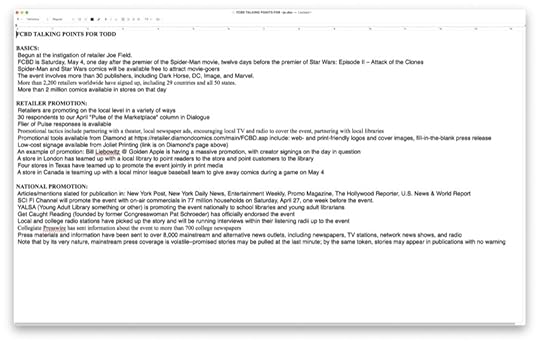
FCBD talking points I compiled for other Diamond folks to use.
In this age of billion-dollar super-hero franchises, it may seem quaint, but at the time, FCBD was considered a pretty revolutionary idea. Comics were still in the doldrums of the big bust of the nineties, and here the industry was coming together to promote itself. It was a pretty big deal.
My budget was zero dollars.
Zero.
I was supposed to launch the industry’s first-ever industry-wide promotional event and I had no money.
So I picked up the phone. I started cold-calling and cold-emailing everyone I could think of. Every news contact I had. Every organization focused on promotion and marketing. TV Guide! Cartoon Network! I tracked down every reporter I could find who had ever done a story about comic books and bombarded them.
I got lucky. A lot.
Started calling USA Today, CNN, everyone I could think of. Realize I had zero experience in this sort of thing. I was just making lists of everyone I could think of that would have any interest whatsoever. I called, e-mailed, filled out contact forms. At the time, MasterCard was doing it’s “Priceless” ad campaign, and I came up with a hook to tie it into FCBD. I called them repeatedly and never heard back. Which is probably sensible on their part, but damn, it would have been cool!
I managed to connect with a woman named Susan Nave at SYFY. (They were Sci-Fi Channel back then.) Stargate SG-1 and Farscape were about to launch new seasons, and it seemed like a good fit. Sci-Fi hired the inestimably talented Neal Adams to draw an original piece of art celebrating those series. Then Diamond arranged to have that art printed on thousands of backing boards that were sent free to store for giveaway, along with comic sleeves with the Sci-Fi logo. A week before FCBD, Sci-Fi ran a day of super-hero programming and promoted the event on-air.
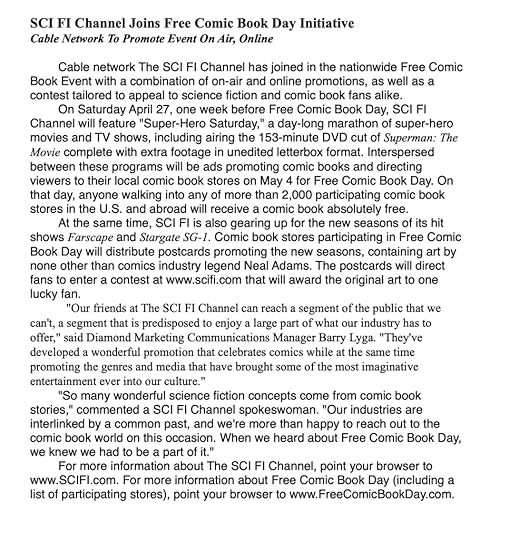
The press release announcing Sci-Fi Channel’s support of FCBD.
It was perfect except that there was some kind of glitch where the guy in charge of the bags and boards at Diamond never told me about a production charge that came to something like $1500. I remember calling Sci-Fi Channel, petrified that they were going to ream me out, but they just laughed and said, “Is that it? No problem.”
What a difference between the budgets in TV and comics!
We offered press releases and as many assets as we could to local stores. One of the things I did was try to explain to local stores how to get local coverage. That was my big brainstorm — this event was coordinated at the national (and international) level, but it was really thousands of local events all happening at once. A story on the evening news would be great, sure, but even better would be a story in the local paper pointing potential customers right at the local store.
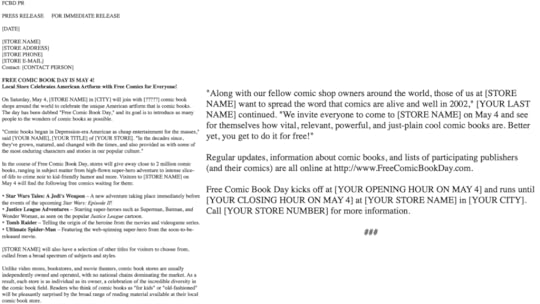
A fill-in-the-blanks “Swiss Cheese” press release we provided for local retailers to use.
I was literally the only person in the comic book industry at the time whose job description included the phrase “promote comic books.” I mean, sure DC had someone to promote DC comics and Marvel had someone to promote Marvel comics, but there was no one tasked with promoting comics themselves as a medium.
One of the biggest issues was internal to the industry — there was a lot of tension between the big publishers in those days, especially DC and Marvel. No one wanted to do something that would help their bottom line if there was a chance it would also help their rival’s. Ugh. Until the event could be proven and popular, no one was really going to go all-out. In a way, we were lucky just to get them on-board at all!

The comics produced by the four inaugural FCBD Gold Sponsors.
After months of work, the day itself arrived. I went to two local comic book stores on that first FCBD. Both were ill-attended and had no customer bump to speak of.
The event was a dismal failure. I was a dismal failure.
I wallowed for the entire weekend. I had given it my all and it hadn’t worked. It was pretty goddamn depressing.
Well, at least Spider-Man was good, right?
The Monday after FCBD, I trekked into the office. Stared glumly at my desk, a mocking reminder of all my fruitless labor.
While my computer slowly chugged through its boot-up process, I checked my voicemail. The excited voice of Patty Jeres from DC Comics erupted forth from the speaker: “Barry! You did it! Congratulations!”
What the hell was she talking about?
And then my email came up and I understood.
Dozens and dozens and dozens of emails. From readers. Customers. Retailers. All of them describing amazing, wonderful FCBD events at stores around the world. Photos and testimonials and thanks from everywhere.
Somehow, I had managed to visit the only two stores in the world with miserable inaugural Free Comic Book Days.
(Since, one of those stores has gone out of business. The other is still humming along and pretty quickly figured out how to make FCBD work and now has a great Free Comic Book Day every year.)
So…it worked. I couldn’t believe it.
I had a couple of days of clean-up, then jumped back into my normal job, getting caught up. Soon enough, the Powers that Were informed me that the event had gone so well that we were going to do it again.
And then again. And again. All the way until today.
My last FCBD from behind the desk was 2005, my last year at Diamond before I quit to pursue writing. (In fact, I left exactly one month after FCBD 2005, figuring I would see through the event and the necessary post mortem and clean-up before going.) I remember being of two minds when I left. On the one hand, I wanted the event to continue in my absence. On the other, I kinda wanted it to fall apart without me.
Well, it didn’t. If anything, it got bigger and better, which — on some days — makes me wonder if I was holding it back!
Anyway, Happy FCBD! And here’s to many, many more! Put on a mask and go get a free comic book today! (freecomicbookday.com will tell you where to go!)
As a bonus for reading this far, here are some more documents from the past!
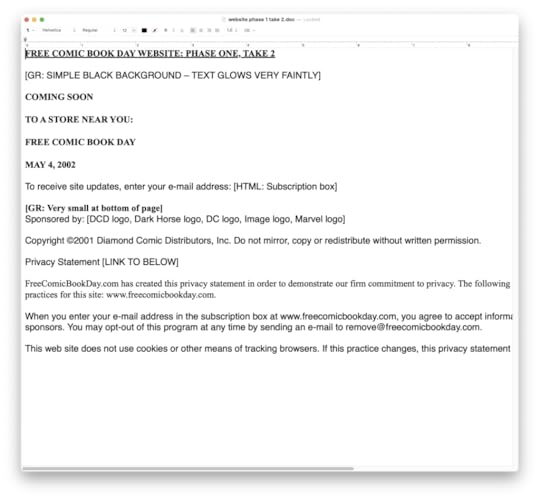
This is the text I provided to the Diamond web designers for the very first freecomicbookday.com.
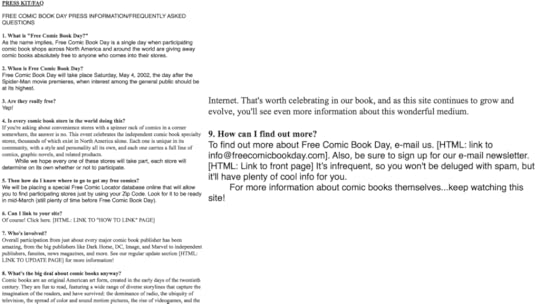
The original press kit for the FCBD website.
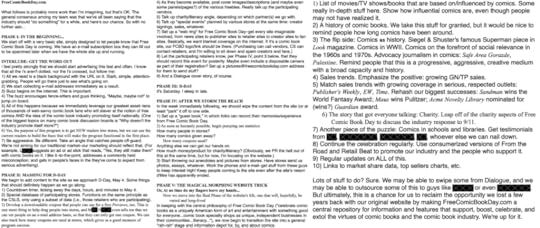
My original outline/plan for promoting FCBD online. Probably written in late 2001.
July 9, 2021
Publishers Weekly Stars Time Will Tell!
I’ve published a couple dozen books at this point, but the anxiety of waiting for reviews never really goes away. It may become milder as the years and the pages fly by, but it’s always there.
So I was both stoked and relieved to get the first review of Time Will Tell and find that it was a starred review!
Lyga … grips readers at every turn in this layered and provoking mystery that tackles sexual assault, mental illness, bullying, homophobia, and racism…. Switching perspectives between the present-day and 1986, Lyga’s novel is packed with unexpected twists and red herrings.
See the complete review here and check out the first four chapters of the book here.
Time Will Tell will hit bookshelves on September 28, 2021! You can preorder the book here: Amazon | Apple | BN.com | Indiebound | Kobo
April 28, 2021
Read the first Four chapters of TIME WILL TELL!
Just like the headline says: Time Will Tell lands on bookshelves on September 28, but you can get started with it now with a sampler of the first four chapters.
Download the PDF here!
And should you then feel compelled to preorder the book, you can do so here: Amazon | Apple | BN.com | Indiebound | Kobo
March 28, 2021
A Tale of Two Barrys, Part 2
Last time, I talked about how I was brought on-board to write The Flash trilogy and how I littered the books with pointless-but-amazing Easter eggs.1 Now let’s talk about how the second trilogy, Crossover Crisis, came to be.
When I was wrapping up The Tornado Twins, I had an inkling that there might be some interest in continuing the story, so I left things open. I also wrote an epilogue that would explicitly set up a new adventure. At the time that Book 3 had to go to the printer, though, Abrams and the CW had not yet decided if there would be more books, so I removed the epilogue. For the curious, here it is:
EPILOGUE
[DESIGN: WHITE TEXT ON BLACK, IF POSSIBLE, PLEASE — THANKS!]
Go…!
Hurry…! Time is running short…
Warn the Flash!
Find Supergirl!
The Curtain is falling! The great void arises…!
RUN!!!!
As you can see, there wasn’t much to it — it was just a teaser to get people to come back “next season,” like a post-credits sequence. My plan was to pay homage to the Arrowverse’s crossovers by having Supergirl show up in the next trilogy.
Anyway, shortly after the book went to press, I received another phone call from Andrew Smith, telling me that it turns out there would be another trilogy…only this time I would get to use all of the characters from all of the CW shows!2
My original plan wasn’t big enough for that cast, so I was glad that we scrapped the epilogue!
I had by now more than earned the confidence of the studio, so I could really let my freak flag fly. Plus, by this time, the CW shows had all crossed over into the massive, sprawling Crisis on Infinite Earths storyline. The original comic was an enormous source of fun Easter eggs and continuity porn; the TV show built on that with references to almost every DC live-action series and movie ever, including a spoileriffic wink and nod to the current DCEU movies.
I had to bring my A-game.
I plotted out a madcap adventure through space, time, and alternate dimensions. I brought in the whole damn Crime Syndicate of America to harry Earth-1 in the very first book. Just to show I meant business, I also threw in 10,000 brand-new speedsters. And…
Yes.
Ambush Bug.
Because I have no shame and absolutely no self-restraint.
I knew that this would probably be my last hurrah, that there would be no further trilogies after this one. So I wanted go out with a bang. (And with Ambush Bug’s whoopee cushion…)
If you’ve read this post, you know I’ve always loved the Crime Syndicate of America, so I made them the centerpiece of the first book in the new trilogy, the colon-heavy The Flash: Crossover Crisis: Book 1: Green Arrow’s Perfect Shot. I had them absolutely dominate in a pitched battle on the streets of Central City, as a devastating breach looms, within which awaits an even more powerful foe: Anti-Matter Man.3
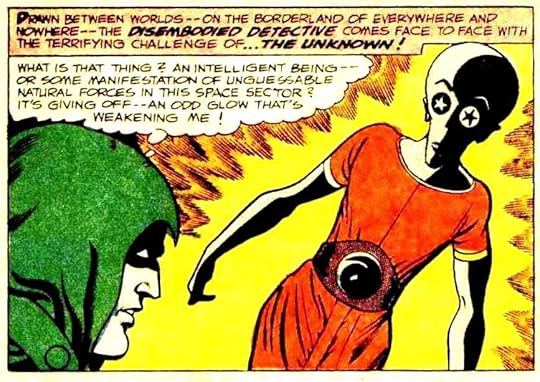
Yeah, he’s goofy-looking as all hell, but I had him responsible for utterly wiping out Earth-27. (Hey, I created it — I’m allowed to destroy it!)
I got to continue my story from The Tornado Twins, with a Barry who is a little wiser and a lot more optimistic following his trip(s) into the future(s). And I got to play that off against the darker characters from Arrow, using folks like Felicity and Mr. Terrific and Wild Dog, in addition to Oliver, of course.
When the second book, Supergirl’s Sacrifice, came along, the cast grew even more. It was starting to feel a little overwhelming, honestly, but I think managed to juggle it all without dropping anything or breaking anything. Plus, I got to live out a childhood dream by putting words in the mouth of the Man of Steel. Holy crap.
That book also included a subplot in which Cisco and Mr. Terrific are hurled back in time to the Wild West, meaning I got to play with some of DC’s classic Western heroes: “Pow-Wow” Smith and Madame .44. This led to what might be my favorite exchange in all six books:
I’m also particularly proud of this little bit, in which Kara reflects on what it actually feels like to be in telepathic communication with someone…
One of my favorite aspects of this particular book was working in references to classic comic book moments and concepts. I had the heroes gather at Superman’s old underground lab in Smallville, for example, and even referenced his Superboy robots.
The final book, The Legends of Forever, has just come out, so I don’t want to say too much about it. It is replete with near-toxic levels of geekery and in-jokes, Easter eggs a-plenty and more obscure references than you can shake a stick at!
It also begins with a monologue from the Phantom Stranger, mimicking the old splash pages in that character’s comics…
If you want to know some of my favorite moments from this final book, go check it out!
Thanks for joining me on this trip down memory lane. I hope you’ve enjoyed reading these books as much as I’ve enjoyed writing them!
The BLog
- Barry Lyga's profile
- 2185 followers



